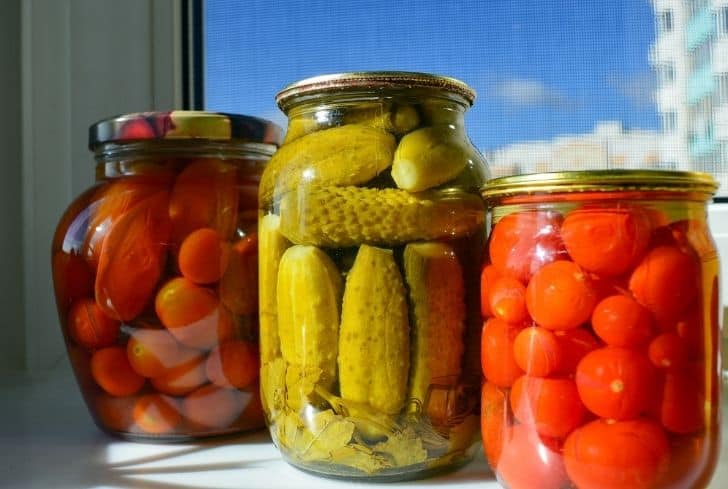We are often driven by the notion that if you can eat something, you might as well choose to compost it. We are encouraged to compost even the last bit of kitchen scraps. Interestingly, this doesn’t apply to meat, milk, or dairy products. So, what about pickles? Is it a good idea to just throw pickles in your compost pile? What are the repercussions and what is the logical explanation behind it? Let’s find out!
Can Pickles Go in the Compost?
Technically, you can compost pickles. However, in case you choose to do so, always exercise moderation. Food items like meat and dairy are not recommended when it comes to compositing. That is because they are often known to attract insects, pests, and other organisms that may damage or ruin your pile.
Even though pickles do not have the same issue, they are still deemed slightly problematic as they are known to tamper with the usual pH balance of your compost pile.
You might be wondering how this works because cucumbers and dills (which are also often the main ingredients of pickles) are known to be highly nutritious to the soil. They infuse the soil with copper, potassium, and a range of other minerals that keeps it healthy and fertile.
However, the problem here lies in the vinegar that often ends up adding excessive acidity to the pile. Because of the high acid content of the vinegar, dozens of beneficial bacteria end up dying, thereby ruining your purpose of creating the compost pile in the first place.
Salt Content in Pickles
In some cases, pickles are also known to carry high salt content that can later pose a harmful impact on plants. Most of the common pickles, as available in your regular grocery stores come laden with preservatives. The result? The ingredients of these pickles break down slowly, thereby damaging the soil and plants in proximity.
Vinegar in Pickles
The takeaway, however, is the vinegar in pickles. Vinegar contains several useful elements that can potentially improve the quality of the pile. An excellent example would be Apple Cider Vinegar, which is known for improving compost quality and boosting the growth of plants therein.
Certain pickles also come with high garlic content. As garlic is known as a pest deterrent, using these pickles (in moderation) might be a good idea, especially when it relates to your compost pile.
Adding Pickles in Moderation
So, yes, you can certainly add pickles to your compost pile. But as you do that, check the amount and make sure it is done in moderation. A quality compost pile will contain a diverse range of biodegradable materials and because pickles in small quantities are biodegradable, there’s no reason why you shouldn’t add them to the compost pile.
With that said, we are not suggesting dumping out five huge pickle jars in a tiny compost pile. Smaller chunks and leftovers, however, are completely acceptable.
If you want to be extra cautious, you might even consider separating the pickle from the brine, and then adding the pickle to the compost pile. The brine can later be used to kill the weed. Alternatively, you can also refrigerate it and use it later for cooking or as a home remedy for joint cramps.
While we are traditionally dissuaded from adding pickles to our compost pile, there is no harm in doing so, as long as it is done in moderation. Pickles come with several ingredients that have plenty of offerings for your otherwise regular compost pile. So, you can certainly add pickles to your pile, in small and moderate amounts.
Note: In case you are planning to use pickles or foods containing pickles as part of vermicomposting projects, try to feed your worms some alternate food that isn’t pickled or doesn’t contain pick-like content, following day. If you are looking to neutralize the acidity of pickles, just add a dash of lime to the compost. This will keep the worms safer and prevent any greater damage.
Do Pickles Decompose?
Pickles are primarily made from vegetables like garlic, apple cider vinegar, cucumbers, cabbages, et all. Because all of the listed items are vegetables, there is no reason why they wouldn’t decompose. The problem, however, lies in the added ingredients of pickles. Very often, pickles contain salt, acid, vinegar, and similar other properties that may take time to decompose.
Pickles may decompose for an even longer time if they contain high amounts of preservatives. These preservatives take a couple of days to break down until they are fully decomposed only can it potentially damage your pile, but may also affect the quality and growth of your plants.
That is why always read the label instructions and try to settle for a mostly organic pickle. Or better yet, make your own pickles at home because these are the fastest to decompose.
How Long Does it Take For Pickles to Decompose?
Depending on the type of pickle you are using, it can take anywhere from a couple of days, weeks, or months to decompose. The rate of decomposition entirely depends on the ingredients of the pickles and the amount you have added to the compost pile.
If you have added smaller amounts of homemade pickles, they won’t take much longer to decompose. If, however, you are using a preservative-laden variant of pickle, it can take a couple of weeks to months to fully decompose.
Because there isn’t any specific rule of thumb to consider here, always try to use organic and homemade pickles in your compost pile.
Can You Freeze Pickles?
Yes, you can certainly freeze pickles, and depending on the type of pickle, it can last in your freezer for up to 6 months or more. However, to make sure your pickle is safe and still edible, you need to store it properly in an airtight and sealed container.
Check the quality of the jar you’re storing the pickle in and make sure it is refrigerator safe. Unless you consider this small factor, you might end up breaking the jar of the pickle.
Steps to Freeze Pickle
You can freeze both homemade and store-bought pickles once you follow the right guidelines. Both are safe and freeze exceptionally well. In case you are doing this for the first time, here are a few steps to get you started:
Step 1:
Choose your pickles and prepare them. If you are making them at home, don’t forget to retain the brine as you will need this as you freeze the pickles.
Step 2:
Next, transfer your pickles to a solid glass jar. Don’t overstuff them and leave some room in the jar. In case you have huge quantities of pickles, use multiple jars for them.
Step 3:
Finally, after the pickles are transferred to the jar, add the brine for better preservation. Do not use water as it may affect and ruin the taste of pickles.
Step 4:
Once you’re done with the previous step, seal your jar and make sure it is airtight. For added security, layer it with a freezer bag. This is designed to prevent cold frozen air from entering the jar.
Well, that’s exactly all you need to do to store your pickles.
Can Pickles Go Bad?
Whether pickles will go bad, entirely depends on the way you make and store them. In addition, your handling and maintenance process too is taken into consideration. Other factors include the date when the pickle was made or manufactured and the way you have chosen to preserve it.
Making pickles is fairly simple because you just need to add your chosen vegetable in the brine water and a mix of salt and vinegar. Once the concoction cooks and is ready, just pour it into a clean, airtight jar. This simple process will help retain the taste and quality of the pickle. How? Because it immediately traps in the good bacteria, leaving little to no chance for the bad ones.
The brine mix you had created will play a vital role in fermenting the pickle. This in turn will also prevent the pickle from instances of rotting. That is why it is best to follow the correct fermentation guidelines to ensure and enhance the safety of your pickles.
Typically, pickles will last you between 6 months to 2 years depending on the type. There is no specific duration because the shelf-life will entirely depend on multiple correlated and unrelated factors.
However, as long you prepare the pickle well and transfer it to an air-tight container, and later freeze it at the right time, you can rest assured that your pickles will last you the longest time.
Pickles are certainly compostable, as long as you do that in moderate amounts. In addition, always read the packet ingredients of your pickles to make sure they are completely toxin and chemical-free. Remember, anything with harmful chemicals should be avoided in your compost pile. Once you follow this simple guideline, you will be a step closer to a healthy and thriving compost pile.






